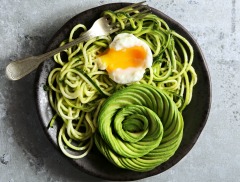Don't just meal plan... meal plan intelligently - with Meal Genius! Sign up for our free newsletter to get delicious recipes, sample meal plans and a whole lot more!
Duck
Duck, or duckling, were first raised as food by the Chinese.
Today's domestic ducks are descendants of two species — the mallard or the muscovy duck. About half the domesticated ducks in the United States are white-feathered, Long Island ducks which have dark, succulent flesh.
Beijing and Rouen, France are also known for cultivating ducks. Broilers and fryers are less than 8 weeks old, roasters no more than 16 weeks old.
The Benefits
- Special diets: Autoimmune Paleo Diet, Candida Diet, Diabetic, Elimination Diet, Gluten-Free Diet, Gluten-Free/Dairy-Free Diet, Grain-Free Diet, High Protein Diet, Low Acid Diet, Low Carb Diet, Low FODMAP Diet, Low Histamine Diet, Low Oxalate Diet, Low Starch Diet, Paleo Diet (Light), Paleo Diet (Strict), PCOS Diet, Primal Diet, Thyroid Diet, Whole Food
- Excellent Source of:
- Good Source of:
- Preferences: No Fish, No Red Meat, No Pork, No Eggs, No Shellfish, No Gluten, No Nuts, No Seeds, No Soy, No Dairy, No Corn, No Yeast, No Peanuts, No Molds, No Pseudograins, No Coconut, No Citrus, No Nightshade, No Legumes, No Grains, Low Carbohydrate, Low Cholesterol, Low Fat, Low Sodium, Low Sugars, Low Saturated Fat
Related Foods
Selecting and Storing
Look for fresh duck with a broad, plump breast and elastic skin. For frozen duck, make sure the packaging is tight and unbroken. Keep fresh duck refrigerated in the coldest section of the refrigerator for 2-3 days, with the giblets stored separately.









